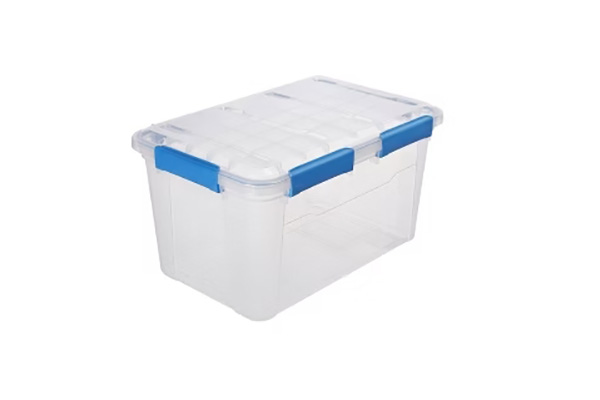Plastic storage boxes are a common household and industrial solution for organizing and protecting items from various environmental threats, including dust, pests, and moisture. But when it comes to dampness, many people wonder: Do plastic boxes actually protect from damp? The answer is not a simple yes or no—it depends on how the boxes are designed, where they are stored, and how they are used.
In this article, we will explore how well plastic boxes guard against moisture, what their limitations are, and how you can enhance their performance in damp-prone environments.

Understanding Damp and Its Effects
Dampness refers to the presence of moisture in the air or on surfaces, often caused by high humidity, condensation, or water intrusion. Over time, damp conditions can damage stored items by:
-
Encouraging mold and mildew growth
-
Causing rust or corrosion on metal objects
-
Warping or degrading paper, fabrics, or wood
-
Creating unpleasant odors
For these reasons, choosing the right storage method is crucial, especially in basements, garages, sheds, or any area with poor ventilation and high humidity.
Are Plastic Boxes Moisture-Resistant?
Generally, plastic boxes are water-resistant. They do not absorb water and are less prone to damage compared to cardboard or fabric containers. High-quality plastic bins made from polypropylene or polyethylene can withstand splashes, spills, and minor leaks.
However, plastic is not entirely moisture-proof. Here’s why:
-
Lid Design: Many plastic boxes come with loose-fitting lids or simple snap closures that are not airtight. Moist air can still seep in, especially in humid conditions.
-
Condensation: If you place a plastic box in a cold, damp space, condensation may form inside. Moisture from the air can settle on the inner walls and damage the contents.
-
Unsealed Cracks: Over time, wear and tear can create small gaps or cracks, making it easier for moisture to enter.
Enhancing Protection Against Damp
To increase the protection that plastic boxes offer against damp, consider the following tips:
1. Use Airtight Plastic Boxes
Choose storage containers that have sealed, gasketed lids or tight clip locks. These help prevent air (and moisture) from getting inside, making them much more effective in damp environments.
2. Store in Elevated Areas
Never place plastic boxes directly on a concrete floor in a basement or garage. Use shelving units or place boxes on wooden pallets to avoid contact with cold surfaces that can cause condensation.
3. Add Desiccants or Moisture Absorbers
Place silica gel packets, baking soda, or activated charcoal inside the box to absorb any residual moisture. These desiccants can greatly reduce humidity within sealed containers.
4. Keep Items Dry Before Storing
Always ensure the items you are storing are completely dry. Storing damp clothes, papers, or tools in a plastic box can create a sealed-in moist environment, which promotes mold growth.
5. Ventilate the Storage Area
While the boxes may be sealed, the overall environment matters. A well-ventilated and dehumidified space helps reduce the risk of moisture buildup inside and around plastic containers.
When to Use Plastic Boxes for Damp Protection
Plastic boxes are a smart choice for protecting items in mildly damp or humid environments—such as closets, attics, or offices with occasional moisture. They are also suitable for storing items in temporary outdoor conditions or during a move.
However, if you’re storing valuable or sensitive items in consistently damp areas, such as old basements or near plumbing leaks, consider combining plastic boxes with airtight lids, desiccants, and dehumidifiers.
Conclusion
Plastic boxes offer a good first line of defense against damp, especially when compared to cardboard or fabric storage options. They are water-resistant and protect items from splashes, minor leaks, and surface moisture. However, to truly guard against damp-related damage, it’s essential to use airtight models, store them correctly, and take extra precautions like adding desiccants.
In short, plastic boxes can help reduce the risk of moisture damage, but they are most effective when combined with smart storage practices.
Post time: 06-19-2025



